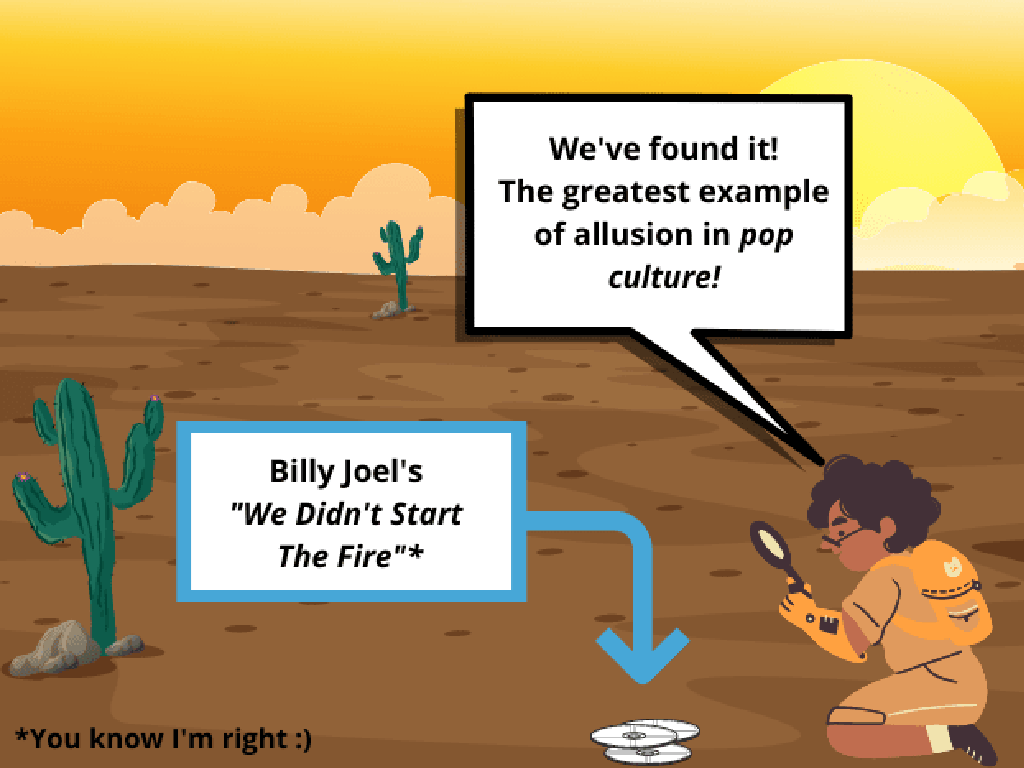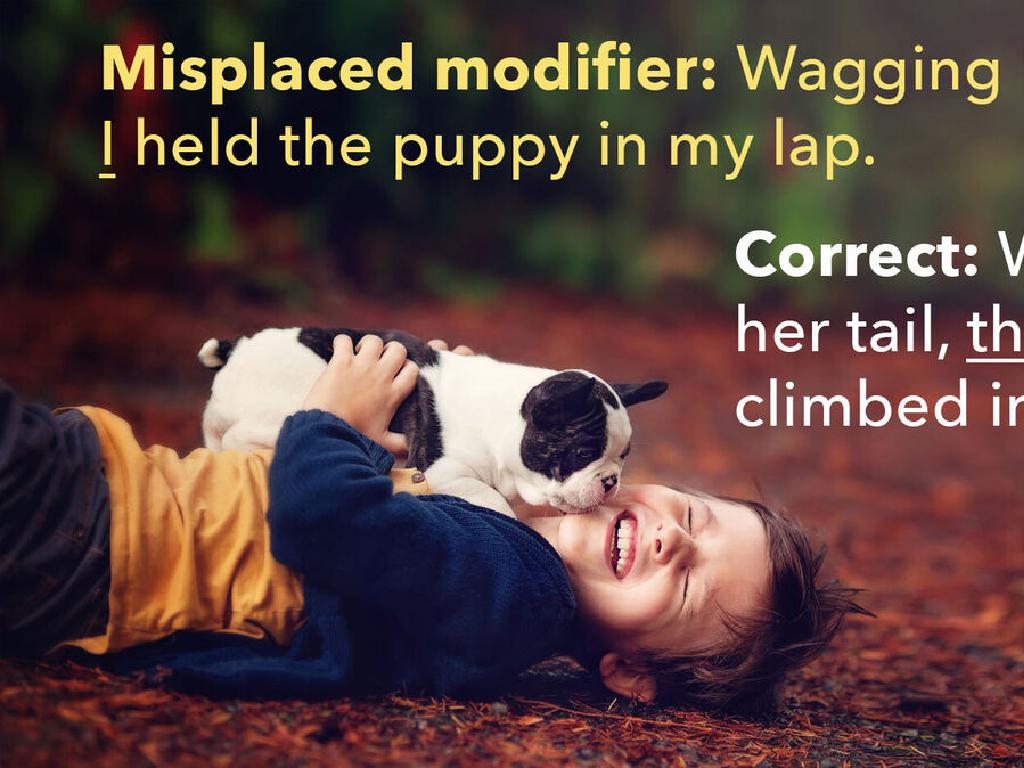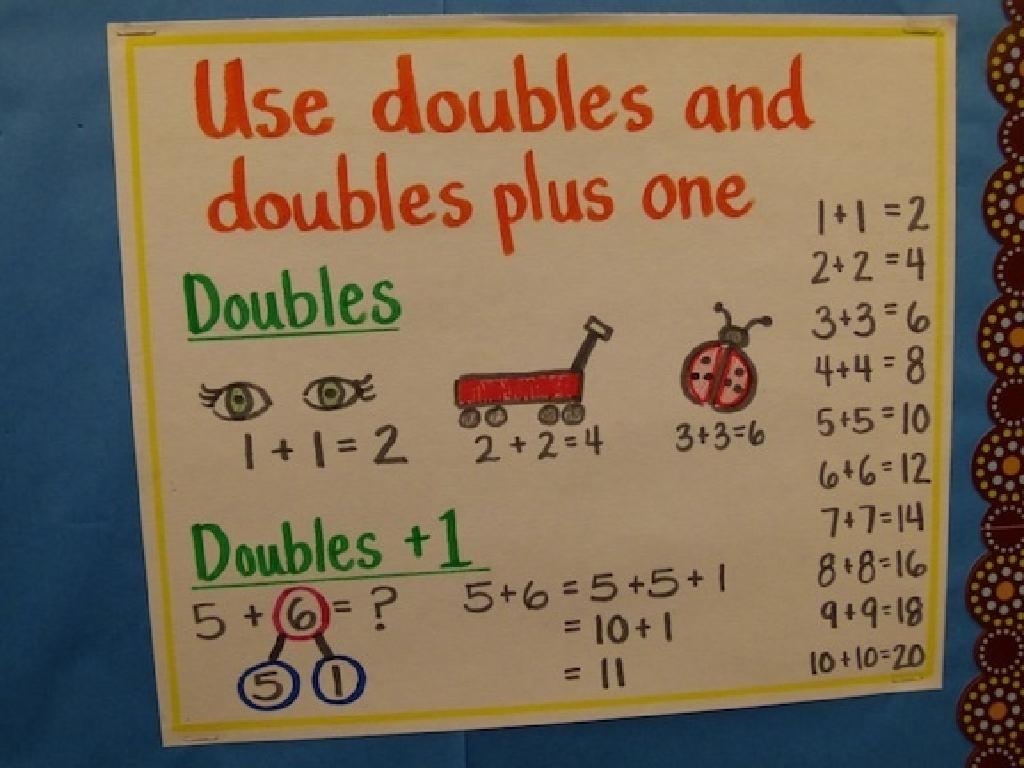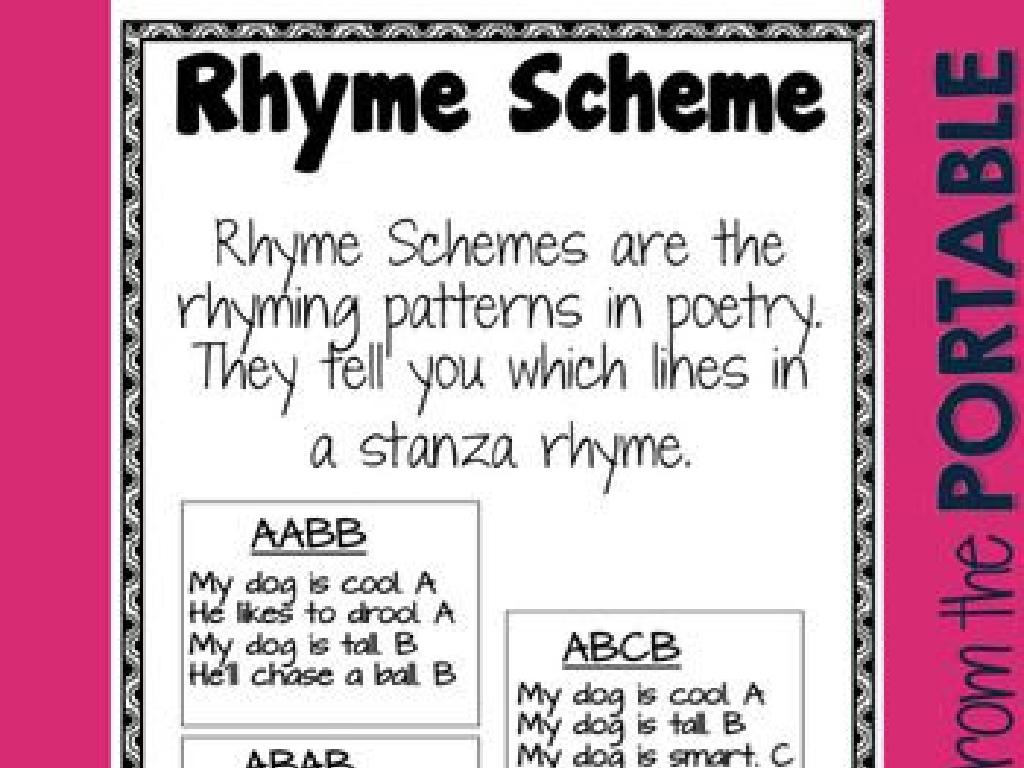Complete The Short I Words
Subject: Language arts
Grade: Kindergarten
Topic: Short I
Please LOG IN to download the presentation. Access is available to registered users only.
View More Content
Welcome to Short ‘i’ Sounds!
– Learn about the short ‘i’ sound
– Think of words with short ‘i’
– Like ‘sit’, ‘hit’, or ‘lip’
– Be short ‘i’ detectives
– Look around, in books, or think of actions
– Find and share short ‘i’ words
– We’ll make a list of our words together
|
This slide introduces the concept of the short ‘i’ sound to Kindergarten students. Start by explaining the sound that the short ‘i’ makes, similar to the ‘i’ in ‘fish’. Ask the students if they can think of any words that include this sound to engage them. Then, explain that they will be ‘short ‘i’ detectives’, looking for words with this sound in the classroom, in books, or by thinking of actions they do every day. Encourage them to listen for the short ‘i’ sound in words and be ready to share their findings with the class. Make it interactive and fun by possibly creating a ‘detective’ game where they have to find a certain number of words with the short ‘i’ sound.
Learning the Short ‘i’ Sound
– What is the short ‘i’ sound?
– It’s the sound in ‘igloo’ and ‘insect’.
– Short ‘i’ vs. long ‘i’
– Long ‘i’ sounds like the word ‘I’ or ‘ice’.
– Examples: ‘igloo’, ‘insect’
– Words like ‘in’, ‘it’, and ‘is’ have the short ‘i’.
– Practice saying the short ‘i’
– We’ll say it together as a class!
|
Introduce the concept of the short ‘i’ sound by comparing it to familiar words such as ‘igloo’ and ‘insect’. Highlight the difference between the short ‘i’ sound and the long ‘i’ sound, which sounds like its own name, as in ‘ice’. Provide clear examples and encourage the students to repeat the sound after you. Engage the class in a group activity where everyone says the short ‘i’ sound together, reinforcing the lesson through auditory learning. This will help them recognize and pronounce the short ‘i’ sound in words they encounter.
Listening Game: Find the Short ‘i’
– We’re playing a listening game
– I’ll say words out loud
– You tell me if there’s a short ‘i’
– Ready? Let’s listen: ‘fish’, ‘cat’, ‘sit’
– Does ‘fish’, ‘cat’, or ‘sit’ have the short ‘i’ sound?
|
This slide introduces a listening activity focused on identifying the short ‘i’ sound in spoken words. The teacher will say words aloud, and the students will listen and determine which words contain the short ‘i’ sound. It’s a fun and interactive way to engage kindergarteners in phonemic awareness. For the activity, the teacher should speak clearly and at a moderate pace, allowing time for the students to process each word. After saying the words, give the students a moment to think before they answer. If a student struggles, encourage them by repeating the word and emphasizing the short ‘i’ sound. Possible variations of the activity could include using different words with the short ‘i’ sound, having students come up with their own words, or even turning it into a game where students get points for correct answers.
Matching Game: Short ‘i’ Sounds
– Match words to pictures
– Identify the short ‘i’ sound
– Listen for the ‘i’ in words like ‘sit’, ‘lip’, ‘win’
– Example: Picture of a pig
– ‘Pig’ has the short ‘i’ sound
– Find the matching word card
– Choose the card that says ‘pig’
|
This slide introduces a matching game to help students recognize the short ‘i’ sound in words. Display various pictures and have corresponding word cards ready. Guide the students to listen for the short ‘i’ sound and match the picture to the correct word card. For example, show a picture of a pig and ask the students to find the word card that matches. This activity will reinforce their understanding of the short ‘i’ sound and help them in word recognition. Make sure to have a variety of pictures and words, and encourage participation from all students. Praise correct matches and gently correct any mistakes, reinforcing the correct sound.
Let’s Complete the Short ‘i’ Words!
– Help complete words with short ‘i’
– Find the missing ‘i’ in ‘_gloo’
– The word should be ‘igloo’. The ‘i’ makes the ‘ih’ sound.
– Fill in the blanks for other words
– We’ll work on words like ‘_t’, ‘_nch’, and ‘_ll’.
– Practice makes perfect
|
This slide is designed to engage Kindergarten students in identifying and completing words with the short ‘i’ sound. Start by explaining that some words are missing a letter and that we need to find the short ‘i’ to complete them. Use the word ‘_gloo’ as an example and guide the students to discover that the missing letter is ‘i’, which makes the ‘ih’ sound. Then, encourage the students to fill in the blanks for additional words provided, reinforcing the short ‘i’ sound. Provide guidance and positive reinforcement as they work through the examples. The activity will help them recognize the short ‘i’ sound in different words and improve their reading skills.
Writing Short ‘i’ Words Together
– Let’s write short ‘i’ words
– I’ll say a word, we write it
– Listen for the short ‘i’ sound
– Words like ‘sit’, ‘fit’, and ‘lip’
– Practice makes perfect
– Keep practicing to get better
|
This slide is designed for a class activity focused on writing words with the short ‘i’ sound. Start by saying a word aloud and then write it on the board, encouraging the students to write it down at the same time. Emphasize the short ‘i’ sound in each word and ask the students to repeat the sound and the word after you. This will help them associate the sound with the letter and its written form. Provide immediate feedback and praise to reinforce learning. For the activity, consider words like ‘sit’, ‘fit’, ‘lip’, ‘bit’, and ‘kit’. Encourage the students to say the words out loud as they write to reinforce the sound-letter association. The goal is to build their phonemic awareness and spelling skills through repetition and practice.
Short ‘i’ Word Hunt Activity
– Let’s go on a word hunt!
– Find items with the short ‘i’ sound
– Look for things like ‘fish’ or ‘pig’
– Team up with a buddy
– Make a list of your discoveries
– Write down words like ‘sit’ or ‘lip’
|
This slide introduces a fun and interactive classroom activity where students will search for objects or images that contain the short ‘i’ sound. Encourage them to work in pairs to foster teamwork. Provide examples of the short ‘i’ sound to get them started, such as ‘fish’ or ‘pig’. As they find items, they should write them down, practicing their spelling and reinforcing their understanding of the short ‘i’ sound. For the teacher: Prepare the classroom with various items or pictures that include the short ‘i’ sound. Monitor the students as they engage in the activity, offering help as needed. After the hunt, regroup and discuss the items found, emphasizing the pronunciation of the short ‘i’. This activity will help students recognize the short ‘i’ sound in different words and contexts.
Class Activity: Short ‘i’ Bingo
– Play Bingo with short ‘i’ words
– Listen for words with the short ‘i’ sound
– Cover the word on your Bingo card
– Shout ‘Bingo!’ when all words are covered
|
This interactive class activity is designed to help Kindergarten students recognize and practice the short ‘i’ sound in a fun and engaging way. Prepare Bingo cards in advance with a selection of short ‘i’ words and pictures. During the activity, call out words that contain the short ‘i’ sound and prompt students to listen carefully. When they recognize a word, they should cover it with a marker. The first student to cover all the words on their card should shout ‘Bingo!’ and the class will pause to verify the words together. This game encourages listening skills, word recognition, and provides immediate feedback. Possible variations of the game could include using different words for each student, playing in small groups, or providing a prize for the winner to increase motivation.
Review and Goodbye: Short ‘i’ Sound
– Celebrating our learning about short ‘i’
– Share a new word with short ‘i’
– Can be a word from our lesson or any new one
– Listen for short ‘i’ at home/school
– Notice the short ‘i’ in conversations, TV, or books
– Keep practicing the short ‘i’ sound!
|
As we wrap up today’s lesson, it’s important to reinforce the learning by celebrating the children’s effort in understanding the short ‘i’ sound. Encourage them to share any new word they’ve learned that includes the short ‘i’ sound, which can help solidify their understanding and recall. Remind them to keep an ear out for this sound in their daily lives, whether at home or at school, as this will help them recognize and practice the sound in different contexts. Provide positive feedback and encourage them to continue practicing, as repetition is key in language learning for this age group.






